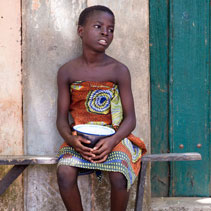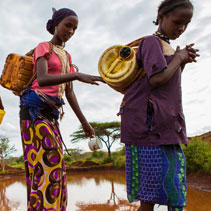The partners
TDR will implement the research programme with funding support from the International Development Research Centre (IDRC) and in technical collaboration with WHO’s Department of Public Health and Environment (WHO-PHE), WHO’s Regional Office for Africa (AFRO) — notably its Programme for the Protection of the Human Environment (AFRO-PHE) — and the International Research Institute for Climate and Society (IRI), Columbia University, New York, USA.
The mission of the Special Programme for Research and Training in Tropical Diseases (TDR) is “to foster an effective global research effort on infectious diseases of poverty and promote the translation of innovation to health impact in disease endemic countries”. To visit the main TDR page on environmental climate change, click here.
IDRC in Canada supports research in developing countries to promote growth and development. The result is innovative, lasting local solutions that bring choice and change to those who need it most.
Since 2003, TDR and IDRC have collaborated on ecohealth and vector-borne diseases research to improve population health and wellbeing. With the new research initiative on “Population Health Vulnerabilities to Vector-Borne Diseases: Increasing Resilience Under Climate Change Conditions in Africa”, TDR and IDRC continue this collaboration in the fight against diseases of poverty for the improvement of public health in some of the world’s least developed countries.
Another major partner of this programme is the International Research Institute for Climate and Society (IRI). The mission of the IRI is to enhance society’s capability to understand, anticipate and manage the impacts of climate in order to improve human welfare and the environment, particularly in developing countries.
Special Programme for Research and Training in Tropical Diseases (TDR)
www.who.int/tdr
International Development Research Centre (IDRC)
www.idrc.ca
WHO’s Department of Public Health and Environment (WHO-PHE)
www.who.int/phe
WHO’s Regional Office for Africa (AFRO)
www.afro.who.int
International Research Institute for Climate and Society (IRI)
www.iri.columbia.edu
The programme incorporates research from five research projects. These are listed below.
Project A: Social, environment and climate change impacts on vector-borne diseases in arid areas of southern Africa
University of Kwazulu-Natal (UKZN)
Durban, South Africa
www.ukzn.ac.za
Okavango Research Institute, University of Botswana (UB)
Maun, Botswana
www.ori.ub.bw
University of Zimbabwe (UZ)
National University of Science and Technology
Bulawayo, Zimbabwe
www.nust.ac.zw
University of Copenhagen
Copenhagen, Denmark
www.ku.dk
Project B: Early warning systems for improved human health and resilience to climate sensitive vector-borne diseases in Kenya
Jaramogi Oginga Odinga University of Science and Technology (JOOUST)
Bondo, Kenya
www.jooust.ac.ke
The Institute of Tropical & Infectious Diseases (UNITID), University of Nairobi
Nairobi, Kenya
www.unitid.uonbi.ac.ke
Baringo County Ministry of Education, Ministry of Health, and Ministry of Livestock and Fisheries (Department of Veterinary Services)
Baringo County, Kenya
www.baringo.go.ke
Project C: Predicting vulnerability and improving resilience of the Maasai communities to vector-borne infections: an ecohealth approach in the Maasai Steppe ecosystem
The Nelson Mandela African Institute of Science and Technology (NMAIST)
Arusha, Tanzania
www.nm-aist.ac.tz
National Institute for Medical Research (NIMR)
Dar es Salaam, Tanzania
www.nimr.or.tz
Climate Systems Analysis Group, University of Cape Town (UCT)
Cape Town, South Africa
www.csag.uct.ac.za
Nairobi, Kenya
Princeton
Princeton, USA
www.princeton.edu/main/
Global Knowledge Initiative (GKI)
Washington DC, United States
www.globalknowledgeinitiative.org
Pennsylvania, USA
Project D: Trypanosomiasis: alleviating the effects of climate change through understanding human-vector-parasite interactions
The South African Centre for Epidemiological Modelling and Analysis (SACEMA)
Stellenbosch, South Africa
www.sacema.org
Tsetse Control Division (TCD), Government of Zimbabwe
Harare, Zimbabwe
www.dlvs.gov.zw/
Vector & Vector-Borne Diseases Research Institute (VVBDI)
Tanga, Tanzania
http://www.tvla-tz.org/vector-vector-borne-diseases-research-institute-vvbdi/
Sokoine University of Agriculture (SUA)
Morogoro, Tanzania
www.suanet.ac.tz
The Climate System Analysis Group (CSAG), University of Cape Town
Cape Town, South Africa
www.csag.uct.ac.za
Liverpool School of Tropical Medicine (LSTM)
Liverpool, UK
www.lstmliverpool.ac.uk
Bindura University of Science Education (BUSE)
Bindura, Zimbabwe
www.buse.ac.zw
Project E: Vulnerability and resilience to malaria and schistosomiasis in the northern and southern fringes of the Sahelian belt in the context of climate change
Centre Suisse de Recherches Scientifiques en Côte d’Ivoire
Abidjan, Ivory Coast
www.csrs.ch
Centre d’Entomologie Médicale et Vétérinaire, Université Alassane Ouattara
Bouaké, Ivory Coast
www.cemv-ci.net
Laboratoire de Physique de l’Atmosphère et de Mécanique des Fluides, Université Felix Houphouet-Boigny (UFHB)
Abidjan, Ivory Coast
www.ufrssmt.org
Département de Santé Publique, Faculté de Médecine, University of Nouakchott
Nouakchott, Mauritania
www.una.mr
Swiss Tropical and Public Health Institute, University of Basel
Basel, Switzerland
www.swisstph.ch
Centre for Neglected Tropical Diseases, Liverpool School of Tropical Medicine (LSTM)
Liverpool, UK
www.lstmliverpool.ac.uk
Korhogo, Cote d’Ivoire


